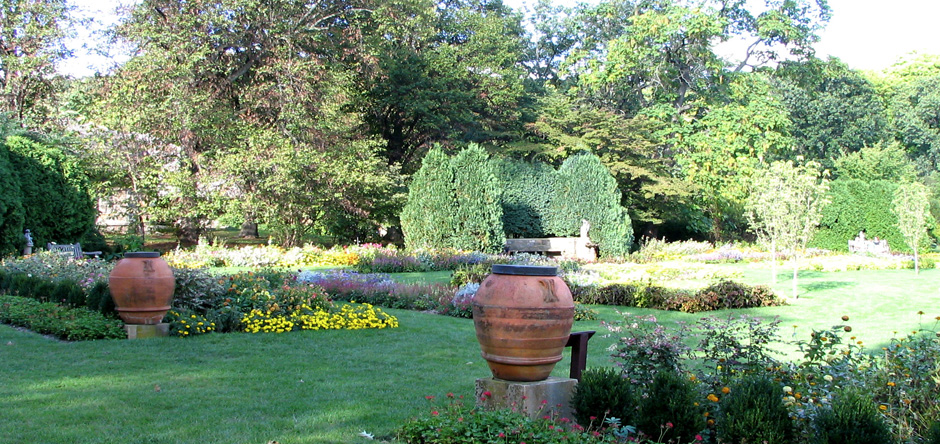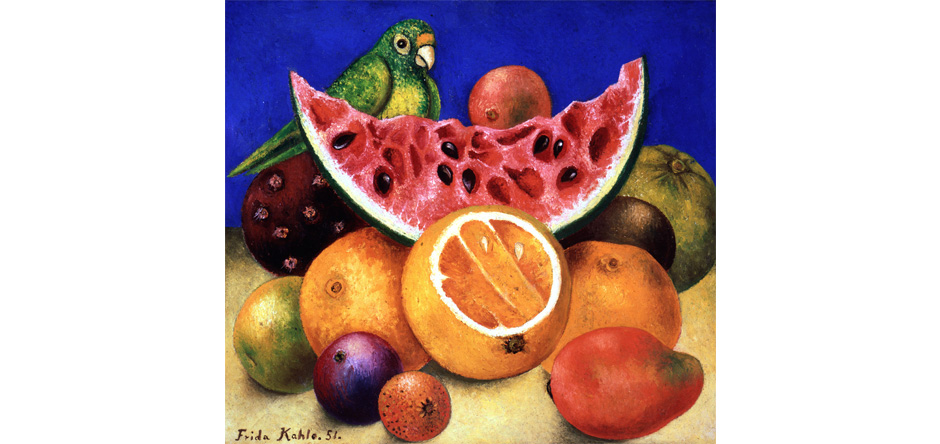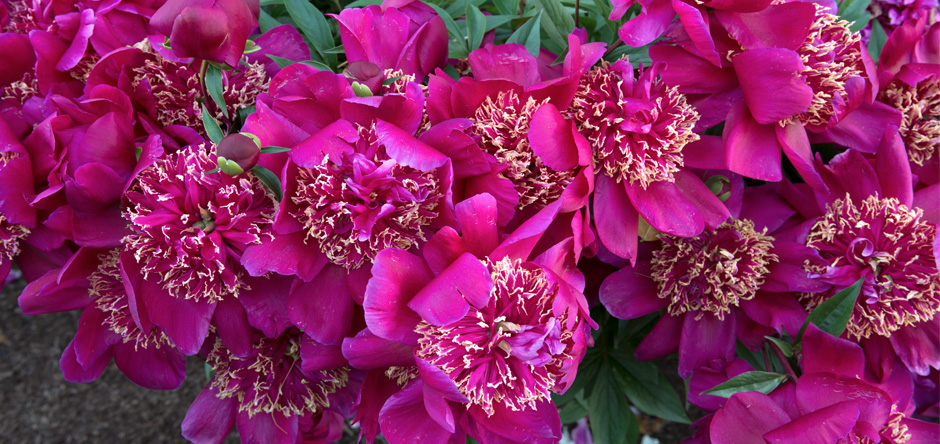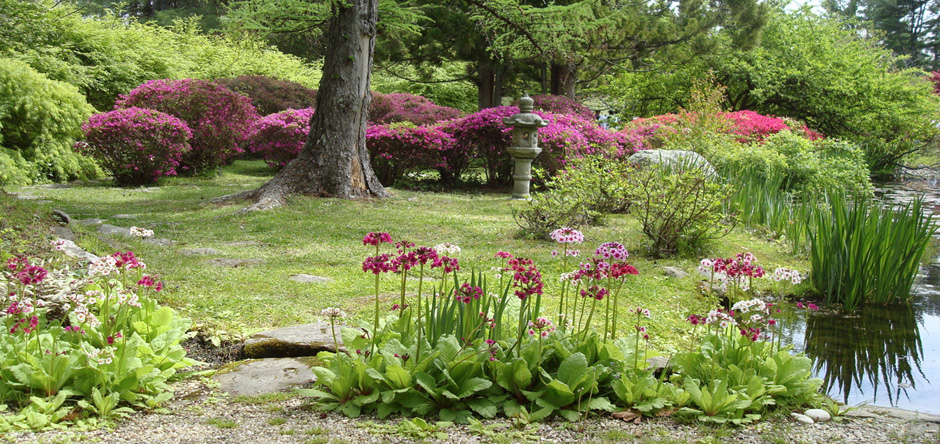It’s a rare topographical paradise that can accommodate both cranberry bogs and peach trees — not to mention cornstalks, tomato plants and strawberry patches.
For this reason, Abraham Browning, speaking at the Centennial Exhibition in Philadelphia in 1876, dubbed agricultural New Jersey “The Garden State,” a barrel open at both ends and filled with good foods that Pennsylvanians and New Yorkers alike were only too happy to grab.
Of course, not everyone shares that view.
In the film “Miss Congeniality,” FBI undercover agent-turned-reluctant beauty contestant Gracie Hart (Sandra Bullock) is asked why New Jersey is called “The Garden State.”
“Because ‘Oil and Petrochemical Refinery State’ wouldn’t fit on a license plate?” she offers.
Perhaps Jersey should be called “The Rodney Dangerfield State”: It don’t get no respect.
Mais pourquoi? Why should the home of Sinatra and Springsteen, not to mention the Giants and the Jets, the Devils and the Bulls, the cultivated blueberry, cranberry sauce, the seedless watermelon, the boardwalk, saltwater taffy, the ice cream cone, the postcard, the zipper, the phonograph, the drive-in movie, the dirigible and the first use of a submarine in warfare be so dissed?
Certainly, the smoking, malodorous array of refineries that stretches out along I-95, threaded by power lines, doesn’t help, although Jersey is hardly the only state with refineries. (What about Texas?) Then, too, there’s a host of shall-we-be-kind-and-call-them-colorful civic leaders who unwittingly play into political stereotyping, like blustery Gov. Chris Christie, whom The New York Times’ columnist Maureen Dowd once dubbed “the Neptune of the Jersey Shore.”
If you’re looking to seal a trifecta, you can always blame the media, for whom “Joisey” is the go-to place for ridicule as well as any story — including some that are very well-made — associated with organized crime, like “The Sopranos” and “Broadway Danny Rose” (one of Woody Allen’s funniest).
Others, however — Tom Waits and Bruce Springsteen specifically — have found poetry and even romance in Jersey’s belching cities and storm-tossed piers.
“….Tonight I’m wanna take that ride
’Cross the river to the Jersey side
Take my baby to the carnival
And take her on all the rides
’Cause down the shore everything’s all right
You and your baby on a Saturday night….
Nothing matters in this whole wide world
When you’re in love with a Jersey girl.”
To be in love with a Jersey girl — or a Jersey boy, for that matter — is to fall in love with Jersey itself — home to a top-ranked college (Princeton University); several first-rate museums, including Montclair and Newark; and enough tony real estate that both Jackie Kennedy Onassis and Richard Nixon had residences there (in Somerset Hills and Saddle River, respectively).
My own childhood introduction was much humbler. My aunt and uncle had a summer home on the Jersey Shore in Wildwood. Built by an old sea captain, it was a ramshackle, eggplant-colored clapboard affair with three porches the length of bowling lanes — a screened-in green and red front porch with a sofa swing; a green-and-white gingham breakfast porch that you could literally roll out onto from the connecting window in the powder-blue bedroom; and a second-story gray and white deck.
This was no oceanfront property. The house and its pier sat on a canal that carried the tang of the sea, and there was little in the way of amenities, certainly no TV. But I thought it was heaven on earth, particularly when the day’s chores — the clamming, whitewashing and mowing — ended and we headed to the boardwalk, me running ahead of my sister Jana, who was always stopping to pull up her socks or scratch her mosquito bites.
First stop was the fudge shop, where you could watch the candy-makers struggle to turn the thick fudge in vast copper bowls and where a little girl dressed like Alice in Wonderland handed out samples at the door from a triple-tiered dish. Then it was on to the boardwalk itself where my uncle would hand the merry-go-round operator a wad of tickets, telling him to let us ride until we tired. ’Round and ’round we went, my aunt and uncle never moving. They just stood there waving at us.
There were other rides, too, like the red and orange helicopters, which rose on spokes that radiated out from a center. (Here Jana would instruct me to sit on the inside, because I was heavier and if anything happened, I would cushion her fall. “If anything happens,” I told her, “we’ll both be dead.”)
We’d dine on hot dogs, chocolate and vanilla swirl ice cream cones and cotton candy, although some nights we went to a fancy restaurant that had a red lobby with brass appointments and a painting of a flapper rising from the sea that I thought was the epitome of femininity.
Afterward, we’d head home with our loot and sit on the front porch eating pistachios until the trucks came around to spray for mosquitoes and it was time to go to bed.
My last memory of the house is of myself standing in the street, looking up at the “For Sale” sign in a second-floor window and crying. Over the years, I’ve tried to recreate the feelings I had there — all adulthood being a reaction to childhood — even turning my basement into a blue and white and teak “beach house,” complete with a mermaid bathroom.
That house, the boardwalk, Wildwood and Jersey will always have a Proustian hold over me. So much so that I only have to scent freshly cut grass or eat a piece of fudge to be back there with my aunt, uncle and Jana, down the shore on a Saturday night, where nothing else matters in the whole wide world.





